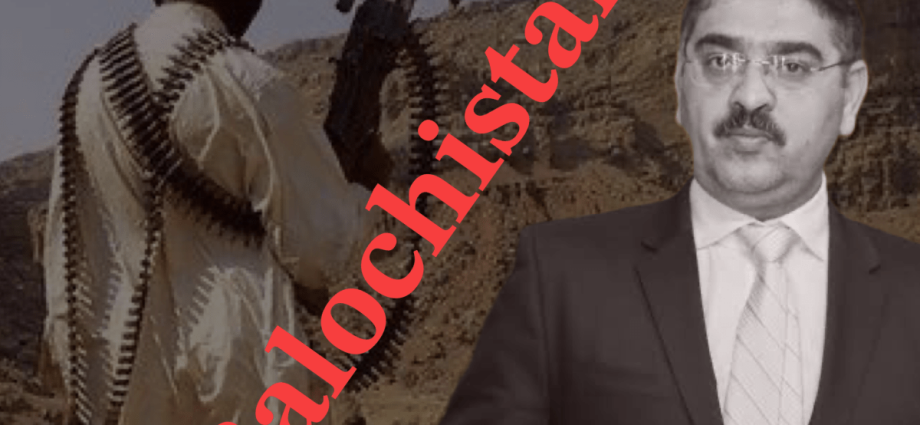
The nomination of Senator Anwar ul Haq Kakar, a resident of Balochistan province, as the caretaker prime minister of Pakistan is a good decision by the powerful establishment to bring people from underdeveloped provinces into the corridors of power. Kakar’s role will be important in dealing with the issue of security and peace in Balochistan.
Balochistan has a long history of conflict, and grievances fueled by fragile security and political policies. Since 1948, the province has witnessed around five periods of conflict between the government forces and Baloch insurgents. The first conflict between the government of Pakistan and the head of the then Kalat State on the issue of merger with Pakistan.
The other insurgencies took place in 1958, 1963, 1973, and 2005. The last started after the alleged rape of Dr Shazia Khali in Dera Bugti, and subsequently the killing of Nawab Akbar Khan Bugti.
The wave of unrest and violence has brought the entire province to the brink of devastation and destruction along with insecurity and instability.
The unjust socio-economic policies of the federal governments have also added much to fueling the fire of grievances among Baloch people. Despite having a wealth of resources, a vast coastline, and a significant geo-strategic location, Balochistan is still the poorest province of Pakistan.
Healing the wounds and pains suffered by Balochistan is utterly important for Pakistan to stabilize its national, regional and extra-regional interests.
The province is characterized by high levels of poverty, unemployment, and lack of basic health services. Civilian governments and political leaderships have focused on filling their own pockets rather than prioritizing the core issues.
Promoting equitable distribution of resources and focusing on socio-economic and development initiatives are prerequisites for an integrated and developed Balochistan.
In fact, political stability equates national stability. Balochistan is a hub of political instability and democratic failures. The stakeholders are not taking the issue seriously.
The political instability of Balochistan is a threat to the successful completion of the China-Pakistan Economic Corridor (CPEC). Establishing a democratic and inclusive political system is one of the important factors that will help to end insurgency. It will put the province on the road toward peace and security.
The fair representation and participation of the parliamentarians from Balochistan in national decision-making processes must be the key agenda of the civil-military leadership of Pakistan.
Academic researchers suggest that insurgency, anywhere in the world, is the result of the unjust decisions and charged grievances against the government. Balochistan is also the victim of the federal government’s unjust decisions and policies. The lack of willingness and commitment to involve rebels in the peace process has further aggravated the issue of Baloch insurgency.
Encouraging dialogue with the Baloch, addressing their grievances, and empowering them in policymaking decisions will help to weaken insurgency, and strengthen national integrity. Offering amnesty and rehabilitation programs for those Baloch militants who are willing to lay down arms will encourage the rest of the insurgents to become peaceful citizens.
For a peaceful Balochistan, improving the rule of law is significantly important. The use of violence against violence is not the key to resolve the prevailing issues in the province. Today’s unstable Balochistan is the result of misuse of power and zero accountability of the officials.
The civil-military leadership should focus on enhancing the professionalism of officials, ensuring the rule of law, and accountability in the criminal justice system. Additionally, improving the weakened local government structure, empowering local bodies, bringing provincial public departments under strict accountability and combating the pandemic of corruption are much-needed initiatives for the development and prosperity of Balochistan.
Much has been discussed and projected about investing in Balochistan, but no major change has been observed so far.
Since the beginning of the fifth phase of insurgency, both the civil and military leadership have aimed to appease rebel Baloch, and increase development budget of the poverty-stricken province, but no major changed has been seen in this regard. The much-discussed CPEC project has also given nothing to Balochistan despite big claims of investments.
The government needs to install major parts of the CPEC’s development projects in Balochistan. For peace and development, it is necessary to invest in the infrastructure to improve connectivity and ensure access to government services.
The government should also promote economic growth to stimulate trade and investment, and equitable distribution of the revenue from the natural resources. The Planning Commission of Pakistan should also promote sustainable development to protect the environment and address resource-related conflicts in strategically important province of Balochistan.
Another factor that has contributed much to the vulnerability and instability of Balochistan is the lack of quality education, information technology, and scientific and academic research.
While living in a technologically advanced world, one cannot turn a blind eye on computer science, cybersecurity, digital data analysis, artificial intelligence and e-commerce. Unfortunately Balochistan, the potential of its youth to explore the world of science, has not benefited from the support it needs to avail of this potential.
The government needs to focus on enhancing access to quality education and vocational training. Creating employment opportunities for the youth of Balochistan to reduce their vulnerability to radicalization should be the principal agenda of the Higher Education Commission of Pakistan.
In this regard, establishing new academic institutions, promoting educational and cultural programs, attracting foreign investment and aid to support development and educational projects should be given priority. The government should also focus on collaborating with international organizations to build capacity and promote peace-building initiatives.
To ensure lasting peace in Balochistan, it is crucial to address the root causes of insurgency and implement comprehensive strategies that promote inclusivity, dialogue, economic development, political reconciliation and about all willingness and commitment. It is imperative for the all stakeholders to work mutually, and pave the way for a peaceful Balochistan.

